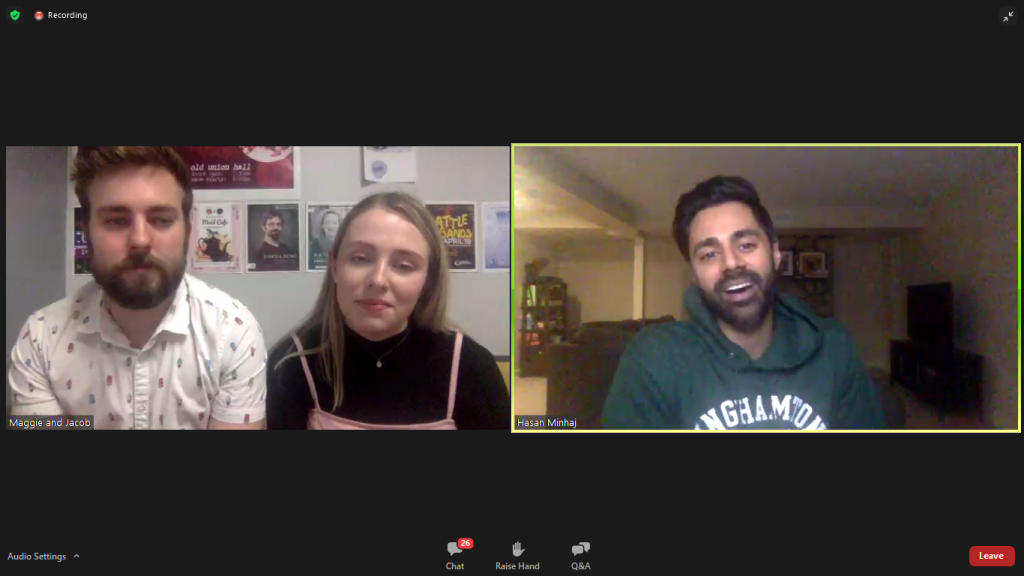On Tuesday, April 13, the Binghamton University Student Association Programming Board (SAPB) hosted “A Virtual Conversation with Hasan Minhaj,” a California-born and raised South Asian American comedian, political commentator and writer. The conversation took place over Zoom, and students had to RSVP in order to attend.
The conversation was hosted and moderated by Maggie Koekkoek, SA executive vice president and a senior majoring in biomedical engineering, Jacob Eckhaus, SA vice president for finance (VPF) and a senior majoring in accounting, and Sophia Cavalluzzi, SA vice president for programming (VPP) and a senior majoring in English. The second Minhaj appeared the chat blew up for the popular comedian, with students greeting him and cheering him on. Minhaj showed up wearing his Pantone 342 Binghamton University sweatshirt.
“I’m hiding here in my basement from my family and my children,” Minhaj said. “I’m thrilled to be with all of you. I wish I was in person with y’all, I’m repping my sweatshirt.”
Koekkoek began the conversation by asking Minhaj about his first stand-up comedy show, and why he chose to pursue a career in comedy. Minhaj discovered stand-up comedy in college, saying that being back at college campuses and performing for and talking to college students always evokes a sense of nostalgia in him.
Minhaj delved into his origin story, starting in high school, where one of his teachers suggested that he join the speech and debate club instead of making wisecracks in the back of the class. Being part of the debate team was Minhaj’s first taste of performing in front of others, and he would sometimes “break the fourth wall” at competitions, saying that none of the high school students really knew what they were talking about when they were discussing such heavy topics.
Minhaj cited watching Chris Rock’s 2004 special “Chris Rock: Never Scared” on his friend’s laptop in freshman year as something that interested him in comedy.
“I remember watching three minutes of it,” Minhaj said. “And I told my friend Imran, ‘Imran, this is funny speech and debate.’ He’s just making an argument, but he’s presenting it in a funny way.”
Minhaj began to see the whole world this way. He was always able to take on a humorous perspective and consider everyday occurrences and life-changing events to have the potential for comedic material.
“I Googled how to become a comedian,” Minhaj said. “The way we all do.”
Minhaj went on to explain the rest of his career, from his first show to his first big audition to when he hosted the 2017 White House Correspondents’ Dinner. He then spoke about his next big project, which is meant to be a sequel to “Hasan Minhaj: Homecoming King” and he’s also working on season 2 of “The Morning Show” with Reese Witherspoon and Jennifer Aniston.
Much of the conversation centered around Minhaj’s South Asian heritage, and how his experiences as a first-generation American of Indian descent shaped his comedic writing and career. He also discussed how he was able to turn his experiences with racism and hate into comedy, and how it has changed a lot for him. It provided material that people could relate to and connect with, and it uncovered many undiscussed yet commonly shared aspects of the immigrant — specifically the Muslim-American, South Asian-American and Asian-American experience: “[it took] our story from the margins to the mainstream.” Minhaj was also asked about his thoughts on the current rise of anti-Asian American hate, and how it reminded him of his experiences when he was younger, and the fear he felt when 9/11 occurred.
“It was the first time in my life I felt ‘Oh bro, you have an away jersey,’” Minhaj said. “Even though you’re a U.S. citizen and you feel like you’re wearing a home jersey, and you grew up in [Davis, California] and you have all your friends, you’re wearing an away jersey. And it’s so interesting that I’m with you all tonight and I’m here 20 years later. I witnessed with my own eyes a whole community of people become otherized. We saw the, ironically enough, effects of the Patriot Act. Here we are 20 years later and I’m seeing a similar but different otherization of another group, where there’s a group of people that I know are scared.”
The last 20 minutes of the event were reserved for questions that BU students sent in. Students asked Minhaj for advice and his takes on interesting topics, such as whether he thinks jokes can go too far. Minhaj’s down-to-earth and relatable personality shone through everyone’s computer screens.
Minhaj signed off by saying thank you and goodbye, and wishing everyone Ramadan Mubarak, as the chat blew up with praise for him once again.



